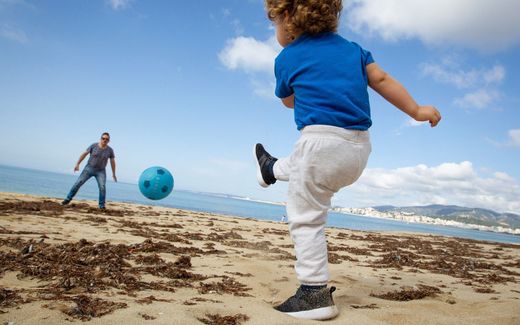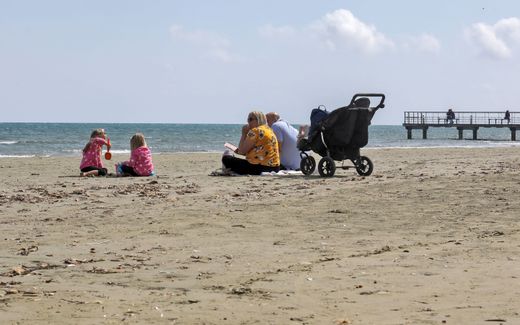Father or mother, who do children find more important?
17-09-2022
Christian Life
Cornelia Huber, Die Tagespost

Photo Flickr, Alex Alexi
Christian Life
Father and mother – children need both of them for healthy development. It is less about gender-specific role models and more about biological sex itself.
Receive CNE's weekly newsletter? Feel free to sign up here.
When mom and dad are equally available, babies prefer... both, Swedish family therapist Jesper Juul says. He does not believe in the thesis that mothers are more important in the first three years of the child's life.
Are father and mother not only equally important but ultimately interchangeable? That is not how Juul wants to be understood. His therapeutic experience has shown for several decades that children who have access to both parents "get along better and develop more harmoniously." Especially in the first four years, during the crucial bonding process between parents and children, children would have to "experience and integrate both "flavours." The advantage for children: a doubling of their social skills.
That is why Juul encourages parents in his book "Leitwölfe sein – liebevolle Führung in der Familie" (Lead wolves to be – loving leadership in the family) to give their children orientation. "The secret of shared leadership between mother and father is to create the space for their differences to have an impact."
Mother's relationship with the child begins earlier
The relationship of mother and father to their child is very different from the beginning. The mother conceives the child and carries it to term for nine months. After that, she is also very close to it physically through breastfeeding. The strong inner, spiritual relationship already begins during pregnancy. Mothers often intuitively know how their little and big children are doing.
On the other hand, the father experiences his child's pregnancy and birth as an external companion. He is not physically affected and does not have to be careful when eating. The father can already establish contact with the child during pregnancy. Still, the real beginning of his relationship is after birth, and it requires initiative. Over time, a bond develops, and his relationship with the child grows.
Masculinity and femininity
It is easy to observe that fathers and mothers treat their children differently in daily life. While mothers tend to be more cautious, giving the child a sense of security, protection and warmth, fathers exemplify pragmatism and a willingness to take risks. Fathers encourage their children to try something new, for example, jumping from the three-metre diving board in the swimming pool.
For children, the parents are a living example of what it means to be a woman or a man. Especially for boys, active, committed fathers are of immense importance in the view of female dominance in education. Boys learn about masculinity from their fathers, and girls learn about femininity from their mothers.
Role models
However, it is not primarily about being role models as parents; in other words, how the couple specifically divides family and employment. A lot has changed in this area. Today's generation of parents is no longer tied to a fixed distribution of roles, which means that women and men can also develop personally. Today, it is hard to imagine that a woman has neither a driver's license nor training nor that men avoid the changing table.
Contrary to what might be expected at first glance, the parent of the opposite sex significantly influences the child's healthy development. Based on concrete case studies from her more than 25 years of practice, the American paediatrician and family counsellor Meg Meeker describes in the two volumes of "Strong mothers – strong sons" and "Strong fathers – strong daughters" how daughters are shaped by their fathers and how mothers, shaping their sons, raise extraordinary men.
Meeker believes boys are more sensitive than girls, but society's code of conduct tells them not to show their feelings. Because boys often conclude that they should never feel anger, sadness, or loneliness, they do not show their feelings and "then get angry with themselves for feeling those emotions in the first place." A boy needs his mother here as a guide. She helps her son to recognise his feelings, name them and to deal with them.
Mother is a "home" for her son
Through an interview with numerous middle-aged and elderly men, Meeker concluded that a mother is a "home" for her son. With her, they learn virtues such as courage, openness and the willingness to forgive others. The father becomes increasingly more important to the son. Through his father's example, he learns to be a man. The mother should be "behind the scenes" and encourage this relationship. Healthy letting go is a balancing act that allows mother and son greater freedom and even a deeper connection, Meeker says.
A good relationship with their father will help girls to become strong and confident women. As the most important man in his daughter's life, the father is irreplaceable. Meeker emphasises that only a father can give his daughter certain things. He does not have to do anything extraordinary. The key is just to take your time. "If you listen intently to your daughter for just 10 minutes a day, within a month, your relationship with her will be completely transformed", Dr Meeker notes in prospect. The daughter's self-esteem will increase, and she will become more confident in expressing her feelings.
Father needs to be an example for his daughter's future husband
In addition to regular undivided attention, a girl also needs her father's protection, courage and wisdom; that is his accumulated life experience. Every father should ask himself what kind of husband he wants for his daughter: certainly, a man of integrity who is honest and courageous, loyal and reliable. Then, according to the author, he should set an example because the daughter gets her image of masculinity from her father.
Men and women complement each other in many ways. Parents can also use this principle self-confidently when raising their children – their children will thank them for it.
This article was translated by CNE.news and published earlier by Die Tagespost on September 9, 2022
Related Articles





